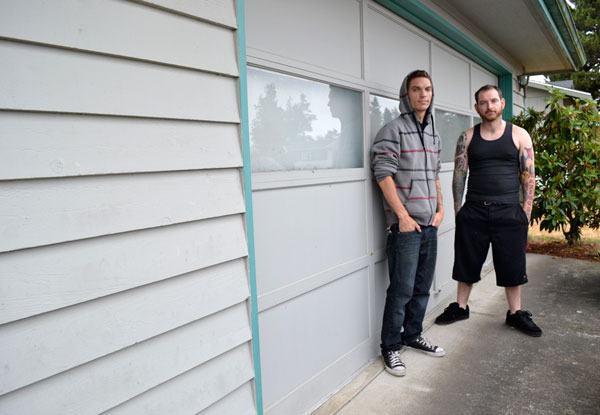One local band will have to find another way to rock out in Sequim.
Jonathon Promer, drummer for heavy metal outfit Jack Havoc, said his band was prohibited from playing at his residence two weeks ago by officials with the City of Sequim following a noise complaint from a neighbor.
He and his band have been rehearsing noon-2 p.m. Tuesdays and Fridays in his home on West Fir Street. Promer said he has spoken to all his neighbors about it to be respectful about when they play.
“We’ve brought it down to four hours of playing a week,” he said. “I really don’t see any better of a compromise.”
However, city officials say the residence has been reported on for years.
Code Compliance Officer Lisa Hopper followed up on a recent neighbor complaint about the band and used a noise meter to test just how loudly the band was playing.
Chris Hugo, Sequim director of community development, said Hopper’s meter read an average of 51 decibels when the band wasn’t playing and an average of 68.5 decibels into the lower 70s when the band was playing.
City councilors made the decision in March 2014 to abandon the city’s 1997 noise ordinance to follow the state’s code. Under state ordinance, one residence cannot be louder than 55 decibels — what city officials equate to a 200-watt generator — and be heard from more than 50 feet away.
Commercial businesses can be slightly louder than residences at 57 decibels, but after 10 p.m. all homes and businesses must be 10 decibels lower than daytime hours.
Hugo said the former noise code didn’t have a definitive measurable standard for noise.
A violation for offenders costs $100 for each day not in compliance, but police and city officials said they’d seek compliance before issuing a fine.
Promer said following city councilors’ decision to buy the noise meter and follow a new noise ordinance last year, his band was reported for noise two or three times but not stopped.
Jack Havoc Guitarist Jared Williams feels no matter when they play, they’d be reported. “Even if we practiced 10 minutes, we’d still get the cops called on us,” he said.
Promer said his infant son sleeps undisturbed in a back room during their practices.
Band members said they have attempted to soundproof Promer’s garage but find noise does escape, such as the garage door rattling.
However, Promer said he doesn’t agree with city officials using a sound meter.
“It’s just an excuse to tell you to stop without turning it down,” he said. “It’s not accurate in any way.”
Hugo said city officials only handle noise complaints when reported, and that they don’t seek out violators.
Promer’s incident is the first time the city has used a noise meter outside of training, and it’s an indicator of a likely violation, Hugo said.
“It’s not proof (of a violation),” Hugo said. “We don’t have any certified operators. It’s too expensive ($1,000 a year). But we will take that step if necessary. We prefer to use education and hope for cooperation rather than keep a certified operator.”
In March 2014, councilors were split on using a noise meter.
Councilor Erik Erichsen said the state’s decibel levels are reasonable and that they won’t know if someone is in violation unless tested.
Councilor Ken Hays disagreed saying the device could be used against people unfairly if they are targeted. Councilor Genaveve Starr said she wanted residents to pursue their efforts creatively unbothered.
Livelihood
Promer said the city’s decision to stop his band’s practices has already is affecting his livelihood. Jack Havoc’s last show was in April in Port Townsend and he was offered two shows locally but he turned them down because he doesn’t know where they can rehearse.
“The way they’ve set everything out between BMI — pressures from national agencies seeking compensation from local venues for allowing bands to play copyrighted music — and the noise ordinance, we can’t practice and we can’t play anywhere between the Oasis and Krush,” Promer said. “The only thing we can think to do is move out of the city limits, but I don’t feel I should have to move. Should I start complaining about people mowing their lawn or hammering? We feel our backs are against the wall more than ever.”
Hugo said the complaints against Promer are more about how loud it becomes and “assaulting sensibilities of some of the seniors in the areas.”
“It’s the incessant noise unlike someone mowing their lawn,” Hugo said. “There’s the general recognition of some things everybody does. It’s a social contract where we agree to live with some of the nuisances of others because we have to do them ourselves.”
Hugo said city codes aren’t based on protecting someone’s livelihood.
“We’d have a heck of a time trying to sort out who can violate what code,” Hugo said. “We could face that with anything like in-home operations where someone is making T-shirts in their basement and receiving hourly deliveries from FedEx.”
Hugo said as cities like Sequim grow, issues like this will increase and become more complex.
Promer and the band say they aren’t giving up despite stopping practices for the time being.
“We’re not trying to upset anybody,” Williams said. “We’re just taking our time. We want to finish soundproofing first.”
“Hopefully we’ll have it so soundproofed by the end of the summer no one will even notice,” Promer said.



